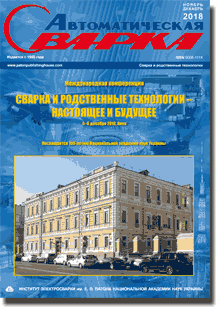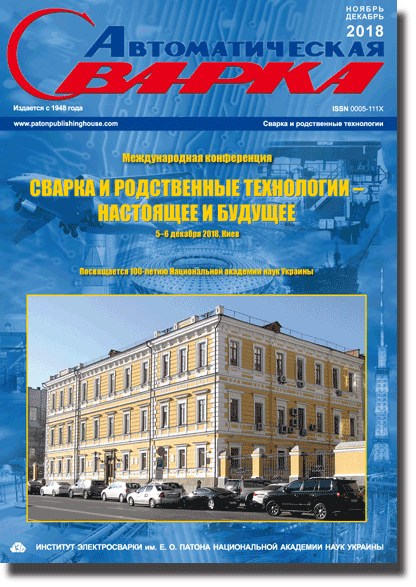| 2018 №12 (01) |
DOI of Article 10.15407/as2018.12.02 |
2018 №12 (03) |

Avtomaticheskaya Svarka (Automatic Welding), #11-12, 2018, с. 19-28
The FSW technology of non-ferrous metals — process conditions and examples of application
A. Pietras, A. Węglowska, B. Rams
Institute of Welding, Polska. 44-100, Gliwice, Str. Bl. Czeslawa 16-18, Poland. E-mail: adam.pietras@is.gliwice.pl
The paper presents welding conditions and the process of creating a FSW weld during welding elements made of wrought aluminium alloys and cast aluminium alloy. Investigations were conducted at Institute of Welding, Gliwice (Instytut Spawalnictwa), on the FSW stands equipped with vertical milling machine adapted for friction stir welding process. Influence of the tool’s dimension and shapes on the plasticization process of welded material and formation of a weld behind the tool, at different welding set of parameters were studied. During the investigations it was noticed, that forces and torque occuring during FSW and stiffness of the clamping system influence the temperature of the welding area, the plasticity of the material, the particles fragmentation and the quality of the joints. On the basis of research correct welding conditions were selected and process of welding was conduct using specially designed instrumentation. The views of exemplary friction stir welded elements and macrosections from the welding areas are shown. 14 Ref., 4 Tabl., 16 Fig.
Keywords: friction stir welding, wrought and cast aluminium alloys, copper tool
Received: 18.06.2018
Published: 06.11.2018
References
- Thomas, W. M. Friction Stir Butt Welding. Int. Patent Application. PCT/GB92/02203.1991
- (2010) Friction Stir Welding. From basics to applications. Woodhead Publishing Limited.
- Mroczka, K., Dutkiewicz, J., Pietras, A. (2010) Characterization of friction stir welds of 6013 and 6013/2017A aluminium alloy sheets. Inżynieria Materiałowa, 31,
- Guohong Luan, Guang Li, Weibing Wang, Ju Kang (2010) The fundamental research of the friction flow welding. In: Proc. of 8th Int. Symp. on Friction Stir Welding (Germany, 18-20 May 2010).
- Kumar, N, Yuan, W, Mishra, R.S. (2015) Friction stir welding of dissimilar alloys and materials. Butterworth-Heinemann (Elsevier), Oxford.
- Hamilton, C., Kopyściański, M., Dymek, S., Węglowska, A., Pietras, A. (2017) Microstructure of friction stir welded AlSi9Mg cast with 5083 and 2017A wrought aluminium alloys. J. of Mater. Eng. and Performance, 26(1).
- PN-EN 10027-1:2007P: Systemy oznaczania stali - Część 1: Znaki stali.
- PN-EN 1706:2010: Aluminium i stopy aluminium - Odlewy - Skład chemiczny i własności mechaniczne.
- PN-EN 573-3:2010P: Aluminium i stopy aluminium - Skład chemiczny i rodzaje wyrobów przerobionych plastycznie - Część 3: Skład chemiczny i rodzaje wyrobów.
- Pietras, A. (2014) Praca Badawcza ST 330, Materials of Welding Research, Institute of Welding, Gliwice.
- Mroczka, K., Pietras, A., Jura, J. (2016) Features of 2017A and AlSi9Mg aluminum alloys friction stir welded with root-side heating, Metall. Found. Eng., 42(2).
- Mroczka, K. (2014) Charakterystyka mikrostruktury i właściwości zgrzein FSW wybranych stopów aluminiu. (Characterisation of the microstructure and properties of FSW welds of selected aluminium alloys). Wydawnictwo Naukowe UP, Kraków.
- Pietras, et al. (2010-2015) Works of the Institute of Welding, Gliwice for industrial partners.
- Węglowski, M.S., Pietras, A., Węglowska, A. (2009) Effect of welding parameters on mechanical and microstructural properties of Al 2024 joints produced by friction stir welding. J. of Kones Powertrain and Transport, 19(1).
The cost of subscription/purchase order journals or individual articles
| Journal/Currency | Annual Set | 1 issue printed |
1 issue |
one article |
| TPWJ/USD | 384 $ | 32 $ | 26 $ | 13 $ |
| TPWJ/EUR | 348 € | 29 € | 24 € | 12 € |
| TPWJ/UAH | 7200 UAH | 600 UAH | 600 UAH | 280 UAH |
| AS/UAH | 1800 UAH | 300 UAH | 300 UAH | 150 UAH |
| AS/USD | 192 $ | 32 $ | 26 $ | 13 $ |
| AS/EUR | 180 € | 30 € | 25 € | 12 € |
| SEM/UAH | 1200 UAH | 300 UAH | 300 UAH | 150 UAH |
| SEM/USD | 128 $ | 32 $ | 26 $ | 13 $ |
| SEM/EUR | 120 € | 30 € | 25 € | 12 € |
| TDNK/UAH | 1200 UAH | 300 UAH | 300 UAH | 150 UAH |
| TDNK/USD | 128 $ | 32 $ | 26 $ | 13 $ |
| TDNK/EUR | 120 € | 30 € | 25 € | 15 € |
AS = «Automatic Welding» - 6 issues per year;
TPWJ = «PATON WELDING JOURNAL» - 12 issues per year;
SEM = «Electrometallurgy Today» - 4 issues per year;
TDNK = «Technical Diagnostics and Non-Destructive Testing» - 4 issues per year.




